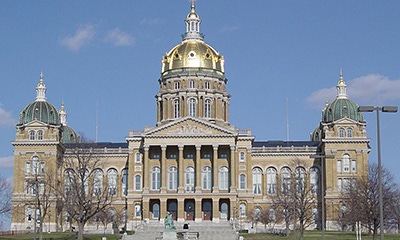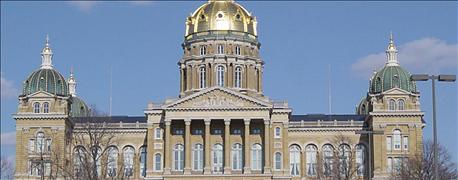March 31, 2016

The Iowa Legislature reached agreement on educational supplemental aid spending last week, and with that major hurdle covered, lawmakers have started eyeing adjournment by the middle of April. Completed tasks include agreements on taxes, K-12 education and how much money is actually available to spend for the fiscal year beginning in July. There are still a number of issues remaining to be resolved, however. Finishing the 2016 session in mid-April would be quite a contrast to last year. In 2015 state lawmakers extended the session into June amid disagreement over education funding.

MAKING PROGRESS: The Iowa Legislature is aiming to wrap up its 2016 session by mid-April. But there are a number of issues that still need to be resolved, including how to fund large-scale water quality initiatives that are being proposed.
Carol Balvanz, lobbyist for the Iowa Soybean Association, says ISA continues to work on three priorities for this session, including securing an appropriation for the ISA’s On-Farm Network, pursuing a state tax credit for environmental practices, and encouraging the legislature to find a way to pass significant and long-term funding for Iowa’s Nutrient Reduction Strategy and water quality programs and practices.
Water quality funding is an issue that needs to be resolved
ISA member Dean Coleman, a farmer from Humboldt County, attended a Hill Visit day last week Wednesday, speaking with the Ag Appropriations co-chairs as well as with legislators working on funding for water quality. The House Ways and Means committee assigned the ISA’s Environmental Practices Tax Credit bill (HSB 653) to a subcommittee made up of Representatives Hein, Byrnes and Isenhart. That subcommittee is meeting this week to hopefully advance the bill to the Ways and Means committee. “We continue to believe that legislators are working on a solution to the water quality funding issue and that we will see progress on that,” says Balvanz.
Iowa Gov. Terry Branstad announced plans at the start of the 2016 session in January to pay for more conservation practice cost-sharing and related water quality improvement practices with some money from a 1-cent sales tax fund that is used for school in infrastructure needs. The governor’s proposal was aimed at addressing long-standing water quality problems that have led the Des Moines Water Works to sue three counties over nutrient runoff from farmland.
House Republicans have introduced a new funding plan
The proposal, which Branstad called “the boldest initiative I’ve ever proposed as governor,” has largely stalled in the legislature. Democrats say it would pit education against water quality. Republicans have introduced separate bills with different approaches to the water quality funding issue.
Republicans in the Iowa House of Representatives introduced a new plan last week to address water quality programs with other revenue sources, but some Senate lawmakers have already expressed reservations. Sen. David Johnson, a Republican from Ocheyedan, says Iowa voters in 2010 approved creation of a fund for soil and water conservation that won’t go into effect until the state raises the sales tax by less than one cent. He says of his fellow lawmakers in the House, “They are complicating the issue in the House.”
How would this alternative water quality plan work?
Several Iowa Republican lawmakers say they plan to introduce a proposal this week to fund large-scale water quality initiatives without diverting funding from education. They say their plan is an alternative to the one proposed by Gov. Branstad that would scoop some future state tax dollars now directed to education infrastructure projects.
Branstad’s proposal would extend the statewide 1-cent sales tax known as SAVE, but it would put a cap on the amount going to schools and use the rest—nearly $5 billion over 30 years—for water quality projects. But that proposal has met a chilly reception in the Iowa Legislature from members of both parties who say voters specifically approved the SAVE tax, which generates about $400 million annually and goes toward school construction and facilities projects, technology needs and property tax relief.
Funding water quality with SAVE dollars isn’t likely this session
Legislature leaders say they plan to address water quality efforts this session but funding water quality through SAVE dollars is likely off the table. “Now, I would say that the bill the House Republicans are looking at does not include the SAVE piece in it,” says Pat Grassley, the House Appropriations Committee Chairman. The Republican from New Hartford says “We feel there are other ways in which we can fund water quality improvement programs at a sustainable level with a long-term commitment.”
He says House Republicans are considering using proceeds from an existing tax on metered water, which he says directs about $28 million annually to the state general fund. Other sources of funding are also being considered. Grassley says this plan would provide increased funding over time to be “as aggressive if not more aggressive” than the level of funding Branstad has proposed.
According to the non-partisan Legislative Services Agency, Branstad’s proposal would generate about $295.4 million during its first 10 years. By 2050 it would generate about $4.83 billion, according to the agency’s projections.
You May Also Like




